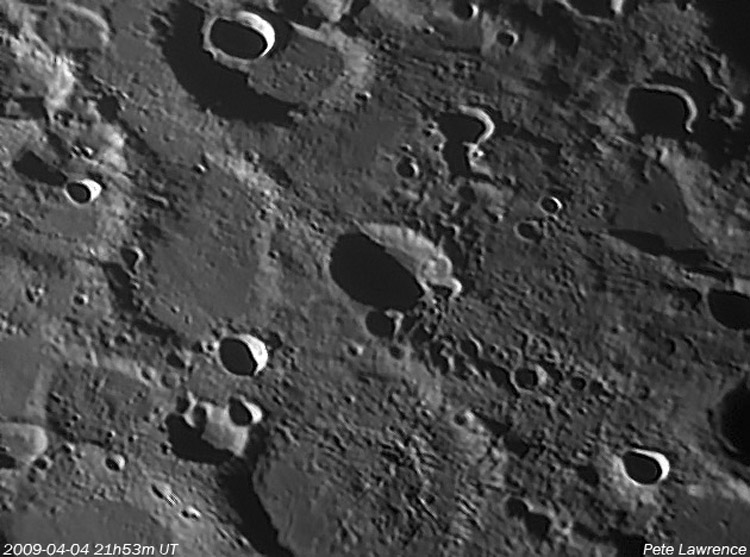April 18, 2009
D

south up image by Pete Lawrence
This is the first LPOD to highlight the crater Wurzelbauer D, right in the center of the image. Is it just a slow day or is there anything interesting at D or nearby? Pete noticed a notch or rille cutting the top of the crater's rim and an apparent further component heading to the upper left and another to the lower right. He commented that It almost looks as if someone's trailed a vast rope across the lunar surface. This is an example of a lunar lineament, a noticeable linear trace that may or not be real. The segment just above D (toward the south) is weird because it looks like a narrow ridge, whereas further away in that direction, and the segment at bottom right, could be crater chains. When interpreting suspected lineament the first thing to check is if it points to a possible source. Bingo! Just out of view to the south (upper left) is Tycho. This is real, a 100 million year old secondary crater chain from Tycho. There are three other lineaments at the bottom of the image cutting Wurzelbauer. They are parallel and aligned diagonally. Looking at other images of the areas to the upper left and the lower right I see no obvious source crater. But these don't look like crater chains, they are more like narrow troughs or rilles. We need to look at other images to see if they are visible with other illuminations and with higher resolution. The other thing that catches my eye in this image is that this is a leaky area. It is highland crust augmented with old ejecta from the Nubium and Humorum basins, but there are places that are much smoother. Examples include a portion of the complex crater floor to the left of D, and similar floors further left. Above D is a smooth spot that is strange because it isn't in a floor, it just looks to be poured on the surface. And near the upper right edge a floor of an old overlapping crater feature is filled with dark smooth material that seems to have a ridge on its right margin, like a flow margin. On a Full Moon image there are some dark spots in the area, but massive ray pollution from Tycho makes it hard to completely identify the albedo of the original surface. These smooth patches may be mare lavas that have leaked to the surface, or they may be some other type or lavas or perhaps fluidized basin ejecta. Now that we've noticed these smooth patches we can pay more attention to their nature in the future.
Chuck Wood
Technical Details
April 4, 2009, 21:53:15 UT. C-14 at around f/24 under mediocre seeing conditions.
Related Links
Rükl plate 64
Yesterday's LPOD: Peru And the Moon
Tomorrow's LPOD: Red Moon Rising
COMMENTS?
Register, Log in, and join in the comments.



